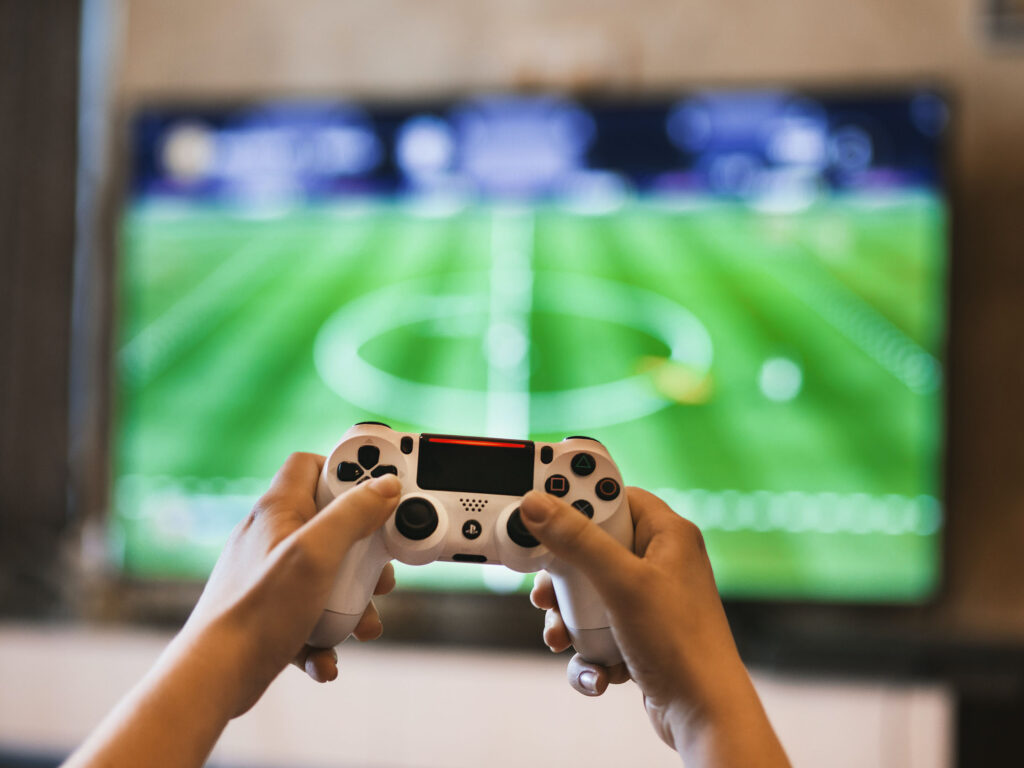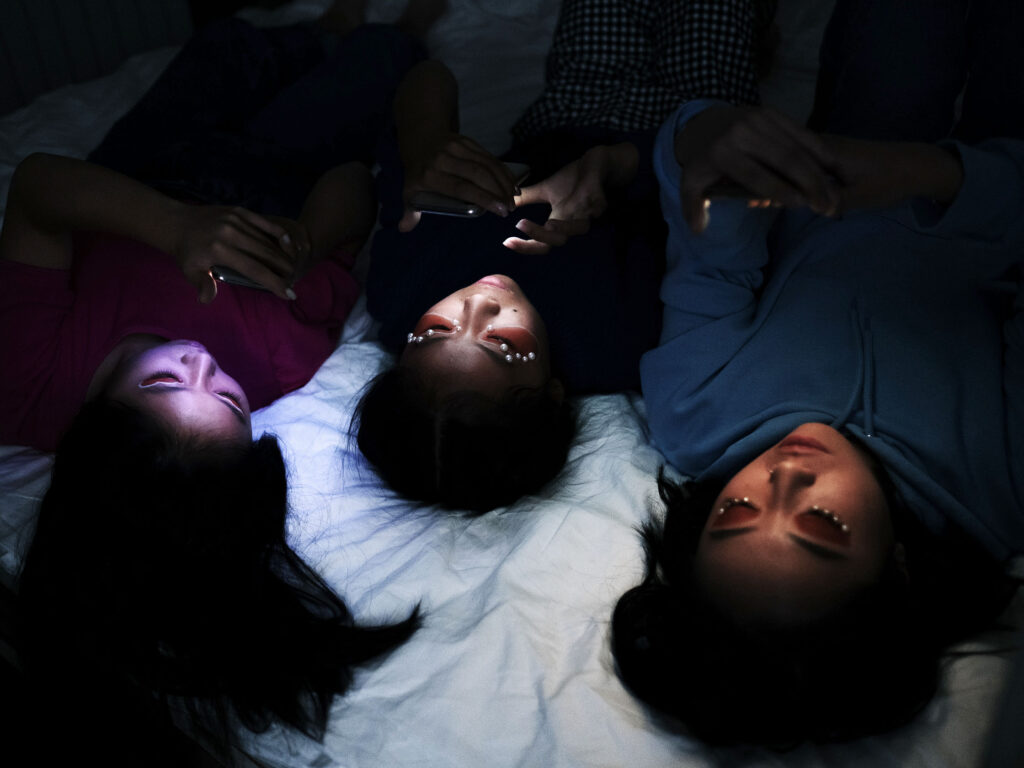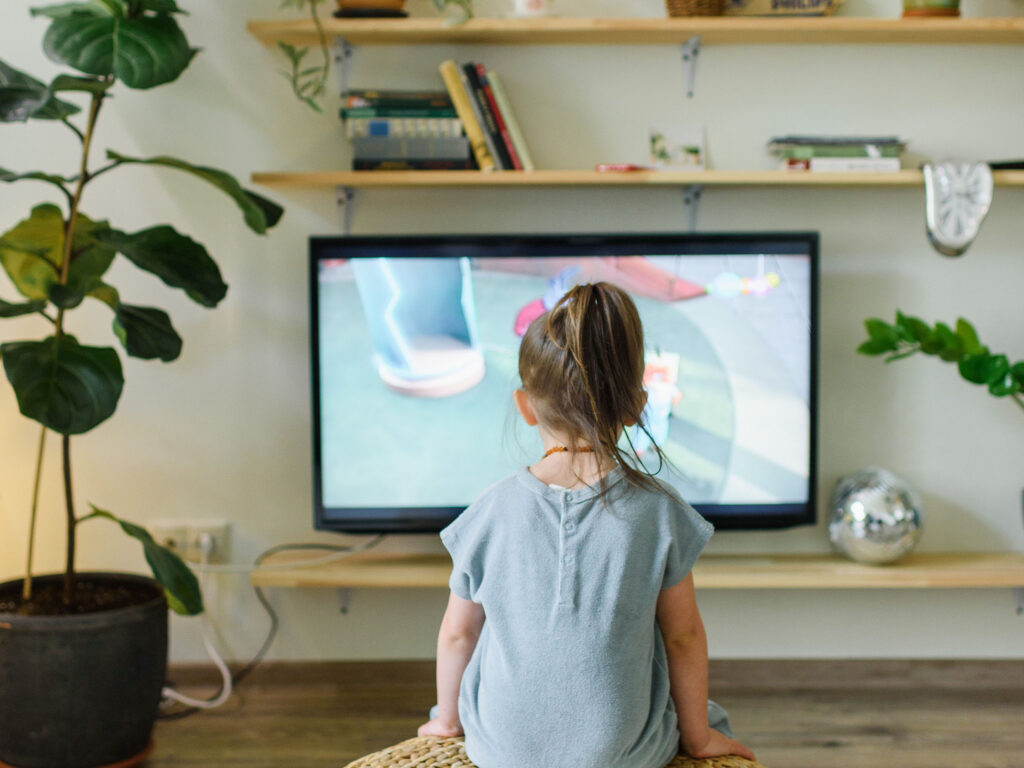Welcome to our ultimate guide on screen time for kids where we will take a look at factual information from reliable sources such as the American Academy of Paediatrics (AAP), UK’s National Health Service (NHS), National Institutes of Heath (NIH) and the National Institute for Health and Care Excellence (NICE) to establish what exactly is screen time? What are the negative effects of too much screen time? And finally What is a good screen time plan for different age groups?
With phones, tablets and TV’s persistently creeping in to our everyday life the mere thought of screen time management may have you thinking you are already losing an uphill struggle. On the flip side screen time is not necessarily the route of all evil! Strangely enough screen time can actually also be educational, supporting a child’s social development. In this guide we aim to look at striking that golden balance with screen time for your kids to maximise the benefits and minimise its associated detrimental effects based on the latest scientific data and trends.
What is screen time?

So what exactly is “screen time” and what devices contribute towards screen time use? Well as defined by the NHS it is actually any time spent looking at a screen and not just smart phones! Devices include:
- TV’s and their connected peripherals e.g. Netflix, DVD’s, Games consoles etc.
- Laptops/ desktops
- And of course the ubiquitous Smart Phones/ Tablets
These devices would all count towards a child’s “screen time.”
ages 8-12
spent on screens
Teenagers
spent on screens
Too Much Screen Time

Excessive screen time for kids and persistent exposure to poor-quality content has been linked to:
- Slowed Frontal Lobe development – responsible for behaviour, judgement and concentration resulting in: Concentration difficulties, Aggression, Lagging social/ language skills
- Childhood Obesity
- Disrupted/ irregular Sleep pattern
- Behavioural issues
- Lower Grades
- Physical activity Deficit
- Poor Self image/ body image issues
- Less time and a poor environment for “real life” learning e.g. Play and real world social Interactions between other children or yourself
Screen time plans
Being the big bad wolf who comes along to huff and puff and “implement a screen time plan” for your little ones is never going to be an easy task… or popular one at that! However the younger you start the easier it will be for them to settle into this new routine. If possible try to listen to their ideas and concerns in the planning process whilst considering their maturity and habits. The right plan for one child may not be a good fit for another.
0 – 2 Years
Unstructured playtime is more beneficial for a child’s development at this age as they will respond better/ are more likely to learn from social interaction and playtime with others. As such for 0-18 months screen time is actively discouraged unless for video calls e.g. A long distance relative. If screen time is introduced between 18-24 months ensure the content is educational, of high quality and that they are always accompanied.
2 – 5 Years
Once they reach 2 think about introducing a small amount of screen time involving movement, music and simple easy to follow storylines. Whilst watching together try to assist with explanations and bridge the gap to reality, applying concepts seen on screen to the real world. Passive screen time (staring blankly into a screen with little to no interaction) should never replace reading, playing or problem-solving. Screen time for your little ones in this age group can be increased to one hour per weekday and if you would like up to 3 hours per day at weekends. Again lets keep it to high quality content.
6 Years +
Past this age screen time boundaries become slightly blurred as each child is unique so this is where your intuition as a parent and knowledge of your little one comes into play. But don’t worry you’re not completely in the dark here as we do have some useful pointers to assist you in determining these boundaries:
screen time for kids: Essential Tips

- ALWAYS employ the KOS Digital Safety B.E.L.T acronym at the start of each day
- Think about applying your child’s “real world” guidelines – Such as play, teaching kindness, being involved and knowing who your child is friends with and what they do together to their “virtual world”
- Whilst watching TV together discuss what you are seeing and be sure to point out good behaviour e.g. co-operation, friendship and concern for others.
- Encourage critical thinking, is everything on the internet true? Which websites can you trust?
- Make Sure your anti-virus and anti-malware are up to date in order to protect your child whilst online
If you do not have any of the above or want to feel that bit safer by switching to one of our rigorously tested and highly recommended products then check out our “Approved” Anti-virus, Anti-malware. We have worked closely with these trusted brands directly to give our loyal readers some excellent discounts. - Research any programs, apps, games before allowing your child to consume this content. Top Tip: Websites like Common Sense Media are great for this!
- Learn about and use parental controls such as our KOS approved parental control app to block or filter internet content. For more information check out our guide on parental control (coming soon).
- Keep your child within viewing distance so you can supervise them at all times
- Stay in the loop – ask your child daily what digital content (including games, apps and programs) they have consumed
- Encourage healthy habits/ activities which don’t involve the use of screens such as offline unstructured playtime or learning a musical instrument and promote screen use that fosters creativity whether that’s coding or digital painting etc
- Introduce tech-free areas or times e.g. during family outings, mealtimes, or perhaps choose one evening each week for board games
- Limit social media during homework hours keep them focused
- Actively enforce your screen time plan and any wind down periods e.g. no devices 30mins-60mins before bedtime
- Think about setting device or app specific (particularly social media or streaming apps) screen time boundaries. Again this could be achieve through the use of our approved best in class parental control app.
- You may want to keep bedrooms screen free consider requiring devices to be charged outside of bedrooms overnight.
- Try not to keep the tv running in the background if its isn’t actively being used for screen time.
- Use online resources such as KidZOnlineSafety.com to learn about online privacy and safety for your little ones
- Try to educate about media and ad creation by other humans who in turn have their own individual points of view/ motives.
- Social Media/ Online relationships are a huge part of adolescence. So far the consensus is that its ok for teens to participate in these virtual environments so long as they understand online etiquette (coming soon).
- For older children who have been given free reign consider using virtual private network (VPN) software to help keep their private life private and personal/ financial information secure. If you do not already have a VPN software bundled with your existing software packages check out our highly recommended KOS Approved VPN. It truly is one of the fastest, most reliable and trusted VPN’s out there!
- Don’t forget children will copy your behaviour so remember to set good screen time examples by living by the rules you actively enforce yourself
What to avoid
- Fast paced programs – younger children find this kind of content difficult to understand
- Content depicting poor behaviour. Children highly impressionable
- Apps with a lot of distracting content
- Advertising in apps – young children find it difficult to differentiate between ads and factual information
- Avoid using tech as a digital pacifier, babysitter or to end tantrums.
- Content that involves monotonously swiping and staring blankly at a screen. Remember interactive and engaging content is far better.
When Children become more tech savvy then yourself

According to V-Tech the vast majority of children will be more tech savvy then their parents by the age of 10. A scary prospect I know! And at some point you will have to decide when they are ready for their first mobile phone. For more information you can check out our guide on Signs your child is ready for their first phone (coming soon). Therefore it is inevitable at some point that they will stumble upon content which you have not pre-approved and has come from unrestricted/ unfiltered devices whether from their own device or a friends. Be sure to discuss the possible scenarios and the behaviour you expect.
Social Media
Your child just like every other child by definition will learn by making mistakes. A responsible parent should ALWAYS monitor their child’s online and social media behaviour looking out for these mistakes and be there for them to help point them in the right direction when they inevitable stumble.
A screen time for kids plan is never cast in stone and as such will continue to develop and grow alongside your child and may need to be adjusting from time to time as they get older. So remember to adapt when necessary and always play an active role in your little ones online safety.

DISCLOSURE: We have worked closely with some of the biggest brands to ensure many of the featured products give our readers the very best deals. If purchased through the links provided we may receive a small commission and YOU ARE A STAR! As by doing so you are part of the community and actively helping to keep children safe online. Thank You!




